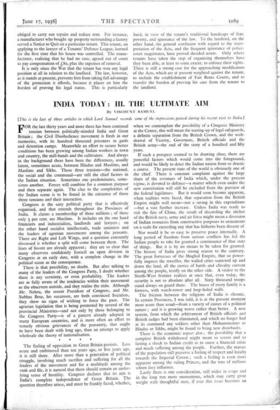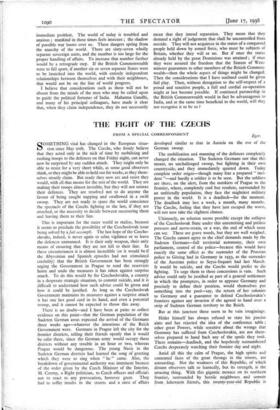The feeling of opposition to Great Britain persists. Less acute
and embittered than ten years ago, or five years ago, it is still there. After more than a generation of political struggle, involving much sacrifice and suffering for all the leaders of the movement and for a multitude among the rank and file, it is natural that there should remain an under- lying sense of hostility. Congress declares that its aim is India's complete independence of Great Britain. The question therefore arises, and must be frankly faced, whether, when we contemplate the possibility of a Congress Ministry at the Centre, this will mean the tearing-up of legal safeguards, a definite separation from the British Crown, and the with- drawal of Viceroy, Governors, British officials and the British army—the end of the story of a hundred and fifty years.
If such a prospect seemed to be drawing close, there are powerful factors which would come into the foreground, and would be likely to deter the Indian nation from so drastic a course. The present state of the world is obviously one of the chief. There is constant complaint against the large share of the revenues of India which, under the present regime, is devoted to defence—a matter which even under the new constitution will still be excluded from the purview of the federal legislature. But it would soon become apparent, when realities were faced, that separation from the British Empire might well mean—not a saving in this expenditure —but a vast further increase. Unless India was ready to risk the fate of China, the result of discarding the shelter of the British navy, army and air force might mean a diversion of Indian resources from constructive purposes to armaments on a scale far exceeding any that has hitherto been dreamt of. Nor would it be so easy to preserve peace internally. A long period of freedom from serious conflicts has led the Indian people to take for granted a continuance of that state of things. But it is by no means to be taken for granted. The history of India gives strong reason to the contrary.
The great fortresses of the Moghul Empire, that so power- fully impress the traveller, the walled cities scattered up and down the land, all the stories of battle and chivalry current among the people, testify on the other side. A visitor to the North-West frontier realises at once that, even today, the security is not so absolute after all. Sixty thousand troops stand always on guard there. The house of every family is a fortress, with watch-tower and loop-holed walls.
The friction between the religions of India is chronic.
In certain Provinces, I was told, it is at the present moment more acute than usual—from a variety of causes of a political nature ; and it is growing worse rather than better. A new system, from which the arbitrament of British officials and British judges had been eliminated, and which no longer had at its command any soldiers other than Mohammedans or Hindus or Sikhs, might be found to bring new drawbacks.
There is the economic aspect also ; the possibility that a complete British withdrawal might mean so severe and so lasting a shock to Indian credit as to cause a financial crisis and much suffering among the people. Further, the masses of the population still preserve a feeling of respect and loyalty towards the Imperial Crown ; such a feeling is even more apparent among the ruling Princes, and the tens of millions whom they influence.
Lastly there is one consideration, still wider in scope and in the long run more momentous, which may carry great weight with thoughtful men, if ever this issue becomes an immediate problem. The world of today is troubled and anxious ; mankind in these times feels insecure ; the shadow of possible war looms over us. These dangers spring from the anarchy of the world. There are sixty-seven wholly separate sovereign units, and the number is too large for the proper handling of affairs. To increase that number further would be a retrograde step. If the British Commonwealth were to fall apart, if another six or seven separate States were to be launched into the world, with entirely independent relationships between themselves and with their neighbours, that would not be on the line of world progress.
I believe that considerations such as these will not be absent from the minds of the men who may be called upon to guide the political fortunes of India. Mahatma Gandhi, and many of his principal colleagues, have made it clear that, when they claim independence, they do not necessarily mean that they intend separation. They mean that they demand a right of judgement that shall be uncontrolled from outside. They will not acquiesce in the status of a conquered people held down by armed force, who must be subjects of Britain, whether they will or no. But if once the status already held by the great Dominions was attained ; if once they were assured the freedom that the Statute of West- minster guarantees to other members of the British Common- wealth—then the whole aspect of things might be changed. Then the considerations that I have outlined could be given full play. Then, without derogation to the self-respect of a proud and sensitive people, a full and cordial co-operation might at last become possible. If continued partnership in the British Commonwealth would in fact be advantageous to India, and at the same time beneficial to the world, will they not recognise it to be so ?



















































 Previous page
Previous page